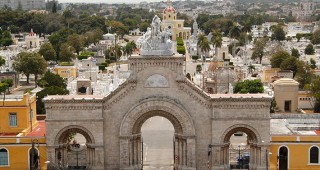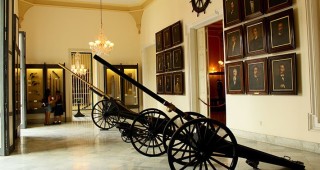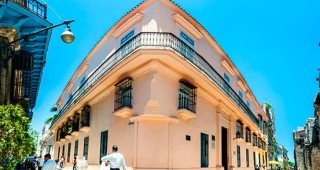The Museum of Mural Painting exhibits some beautifully restored original frescoes in one of the oldest surviving houses in the city, owned by Antón Recio, important figure of 16th-century Havana.
Opening hours: 9:30 am-5pm Tues-Sat; 9:30am-1pm Sun
The Museum of Mural Painting exhibits some beautifully restored original frescoes in one of the oldest surviving houses in the city, owned by Antón Recio, important figure of 16th-century Havana.
Opening hours: 9:30 am-5pm Tues-Sat; 9:30am-1pm Sun

 5+
5+The narrow two-block long alley between Aramburu and Hospital streets in Centro Habana has over the years become a shrine to Afro-Cuban religions through the art created by Salvador González. The buil …

 5+
5+History & architecture Declared National Monument in 1987, this is the most important cemetery in Cuba and its 57 hectares (10 acres) makes it the largest in America. According to Enrique Martínez …
 EclecticAdmission: CUC 1Open: 9am-5pm dailyZapata y 12
EclecticAdmission: CUC 1Open: 9am-5pm dailyZapata y 12 
 5+
5+The entry of the Jesuits in Cuba was formally requested in 1656, and in 1727, a plot was granted for their school and church. Bishop Brother Gerónimo Valdés explained to the King of Spain that Havana’ …
 BaroqueAdmission: FreeOpen: 10:30am-3pm Mon-SunEmpedrado #156 e/ San Ignacio y Mercaderes, Habana Vieja
BaroqueAdmission: FreeOpen: 10:30am-3pm Mon-SunEmpedrado #156 e/ San Ignacio y Mercaderes, Habana Vieja 
 5+
5+The Malecón, first named Avenida del Golfo, is Cuba’s most famous sea-side avenue. The project was undertaken by Don Francisco de Albear, Cuba’s greatest engineer at the time. Albear came up with a co …

 5
5History & architecture Considered the most important example of baroque architecture in the city, this grand building on the west side of the plaza was built in 1792, on the sight of the former pa …
 BaroqueAdmission: CUC 3Open: 9am-6pm dailyCuba e/ Obispo y O’Reilly, Habana Vieja
BaroqueAdmission: CUC 3Open: 9am-6pm dailyCuba e/ Obispo y O’Reilly, Habana Vieja 
 5
5In 1664 the Presbyter of the Cathedral of Havana, don Nicolás Estévez Borges, ordered the construction of a chapel devoted to Saint Francis of Paola (founder of the Roman Catholic Order of the Minims) …
 BaroqueAdmission: FreeAvenida del Puerto, esq. a San Ignacio, Habana Vieja
BaroqueAdmission: FreeAvenida del Puerto, esq. a San Ignacio, Habana Vieja 
 5
5Opened in 1953, this is Cuba’s second largest church, which is visible for several blocks due to its vast dome built in Roman-Byzantine style. The Jesús de Miramar church boasts 14 large mural paintin …
 OtherOpen: 9am-noon, 4-6pm daily; Mass: 9am Mon-Fri; 9am, 5pm Sat-Sun; To visit at other times, enter via the sacristy5ta #8003 entre 80 y 82
OtherOpen: 9am-noon, 4-6pm daily; Mass: 9am Mon-Fri; 9am, 5pm Sat-Sun; To visit at other times, enter via the sacristy5ta #8003 entre 80 y 82 
 5
5The first and main exponent of art deco in the city belonged to Emilio Bacardí and was the home to his famous rum company. After winning the contest held by Bacardí, architects E. Rodríguez, R. Fernán …
 Art DecoAdmission: FreeOpen: 9am-9pm dailyMonserrate esq. a San Juan de Dios, Habana Vieja
Art DecoAdmission: FreeOpen: 9am-9pm dailyMonserrate esq. a San Juan de Dios, Habana Vieja 
 5+
5+The north-west corner of the square is occupied by the 18th-century Casa de los Condes de Peñalver, which has at different times served as a post office, a bank and a school. Today, it houses the Cent …

 5+
5+The 16th-century Plaza Vieja has always been a residential rather than a military, religious or administrative space, and is surrounded by elegant colonial residences, combined with a few very strikin …